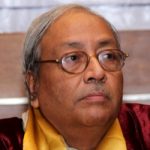For elderly people, it is extremely crucial to have a healthy as well as balanced diet. Various organs of the body are over-used and some of these start degenerating as age progresses. Hence, a balanced diet, to some extent, helps in preventing or slowing down process of erosion and maintaining a healthy life. At the same time, obesity is dreadful for elderly people as the bones related diseases like Arthritis or Osteoporosis or other diseases like Diabetes are either linked to or aggravated by it. Any fall for an obese person may also have dreadful consequences.Considering the above, it is always prescribed that the first step to a good, long and happy life is practice of intake of balanced food.
Dictionary meaning of balanced diet is consuming food that contains various types of nutrients necessary for good health. A balanced diet comprises six (6) main nutrient groups: Carbohydrates, Proteins, Fats, Vitamins, Minerals and Water. Main benefits and some sources of these are given below:
- Carbohydrates: Provides energy. Main sources are whole grains like rice, wheat, etc.
- Proteins: Helps in formation / repair of cells and growth of body. Sources include pulses like dal, milk and milk products and non-vegetarian food like eggs, fish, etc.
- Fats: Provides energy as well as used to store Vitamins. Sources include monosaturated fats including some oils and saturated fats like butter / ghee, etc.
- Vitamins and Minerals: Crucial for growth, repair of wounds, development of bones and developing immune system. Fruits and vegetables are main sources.
- Water: Extremely important as it is used to replenish lost fluid due to sweat and to control movement of bowel.
A balanced diet will mean optimum combination of the above. For elderly people, it should be more of Vitamins / Minerals and Proteins and less of Carbohydrates. Water consumption should be adequate (8 to 10 glasses) unless prohibited by doctor on account of any kidney or other ailments.
Besides, food should also contain following nutrients:
Foods High in Omega-3 Fatty Acids:
These fatty acids are important for elderly people as they help prevent Inflammation, Rheumatoid, Arthritis, and Heart Disease. Some studies show that fatty acids can reduce the risk of Alzheimer’s Disease. These can be found in fish mainly sardines, tuna, mackerel, and salmon. These are also found in flaxseed, soybeans, canola oil, and walnuts.
Foods Rich in Calcium
Calcium helps our bodies maintain healthy bones. Unfortunately, as we grow older, we consume less calcium. The body’s need for calcium is essential; and therefore, in absence of consumption, it begins to absorb it from bones. This makes bones fragile and brittle leading to Osteoporosis. Foods rich in Calcium are mainly dairy products such as milk and milk products, as well as in leafy green vegetables and cereals fortified with calcium.
Foods Rich in Fiber
As we get older, our digestive system slows down. The walls of Gastrointestinal Tract thicken and contractions are slower and fewer which often lead to constipation. Foods rich in fiber promote proper digestion by moving food through digestive tract. Foods rich in fiber include nuts, wholegrain cereal, wholegrain bread and pasta, brown rice, brown bread, fruits, and vegetables.
Foods Rich in Iron
Iron plays a vital role in the body. It produces hemoglobin which carries oxygen in blood from lungs to rest of the body. When we are not consuming enough iron, there is limited supply of oxygen to the body tissues. This results in feeling tired and lethargic. Iron deficiency is known as Anemia.
Foods Rich in Vitamin C
Vitamin C has antioxidant properties which are believed to prevent cancer and heart disease. It also helps in skin elasticity and getting rid of dead skin cells giving healthy skin. This essential vitamin can be found in fruits and vegetables.
Intake of Vitamin D
Vitamin D aids in absorption of calcium in the body. It also aids in maintenance of bone density thereby preventing Osteoporosis. Vitamin D is produced by the skin when it is exposed to sunlight. Some foods come fortified with it such as cereals, milk, yogurt, and juices. Naturally, Vitamin D is found in eggs and certain fish (salmon and tuna).
Foods Rich in Vitamin B12, Potassium and Magnesium
Vitamin B12 is responsible for maintaining nerve function, and production of red blood cells. It is found in dairy products like milk and meat and poultry products. Potassium aids in cell function, reduces blood pressure and lowers chances of kidney stones. It is found in fruits and vegetables like bananas, prunes, and potatoes. Magnesium plays a crucial role in keeping the heart healthy, immune system, and bones strong. It is mainly found in whole grains, nuts, fresh fruits and vegetables. As we grow, our capacity to absorb all the above gets reduced and hence supplement may become necessary.
Other Tips:
Usually elders are requested to follow an inverse relationship of food intake with progression of time during the day: breakfast (good intake), lunch (reasonable intake) and dinner (minimum). Dinner should preferably be taken 2 to 3 hours before sleep so that food is digested before sleep.
Food habit should be developed slowly. Any sudden change may cause more problem. Further, some food may cause side effects like Allergy (skin rashes) for some elders. These trigger points should be identified and discarded.
Conclusion:
Good diet is like a life line to the body by keeping it healthy. And a healthy mind can develop only if the physical health permits it. Besides, balanced and health diet prevents or slows down progression of some of the age-related diseases. As we are aging, decay becomes natural. A good diet helps in regeneration of lost cells and that itself prevents fast aging. Thus, healthy and balanced diet is the first step towards a long and happy life. Let us all follow the principle of having healthy and balanced diet!!
(Author acknowledges the input provided by the social internship project undertaken by students from ITM Business School, Navi Mumbai).
Author Bio

Dr A K Sen Gupta is the Co-Founder and Chief Trustee of My Retired Life Foundation (MRLF). This article has been published in Free Press Journal (FPJ) on 3rd July, 2021, where he is a regular contributor. Dr Sen Gupta was the Director of S.P. Jain Institute of Management & Research, Mumbai and Director & Mentor at SIES College of Management Studies, Navi Mumbai. He was a World Bank Consultant and instrumental in setting up National Banking College in Ghana, Africa and Professor at National Institute of Bank Management, Pune.
एक निवेदन हमउम्र लोगो से जुड़ने का
सभी पाठको से निवेदन है कि आप हमारे फेसबुक ग्रुप "नेवर से रिटायर्ड फोरम" से जुड़े। वहाँ आपको और मित्रो के पोस्ट पढ़ने को मिलेंगे। आप भी अपने विचार सभी से साझा कर सकते है। खास बात यह है कि इस ग्रुप में सभी पोस्ट हमउम्र के लिए विशेष होते है। आप इस लिंक पर क्लिक कर आसानी से जुड़ सकते है, या इस लिंक को (https://www.facebook.com/groups/972813436666682) टाइप करे अपने मोबाइल/ लैपटॉप पर या सीधे फेसबुक पर सर्च करे।





बहुत सुंदरऔर उपयोगी जानकारी है।
Very concise suggestions to aging population on dietary habits.We are what we eat must be kept in mind.
Very useful tips given to seniors
Very nice input.thanks sir
Very very important tips for us for healthy life , by these tips v can manage our requires dietary. I will start by today itself